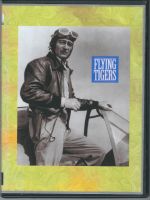
|

|
Buy the Movie Here!
Click on left image for DVD or right image for Blu-ray.
Your comments or suggestions are welcome and encouraged.
Flying Tigers is significant as Wayne's first appearance in a war film. Republic's tribute to an American volunteer group of flyers fighting for the Chinese against the Japanese invaders, it is also less obviously that studio's tribute to the artistry of director Howard Hawks in making Only Angels Have Wings (1939) about a group of mail pilots in South America. Here again, for those who missed the original, is the pilot with the failing eyesight (formerly Thomas Mitchell, here Paul Kelly) who refuses to be grounded and dies in the air; here also is the pilot with a blot on his record, desperate for another chance despite the contempt he will have to endure (formerly Richard Barthelmess, now Edmund MacDonald); here again is John Carroll, a member of the Hawks flying team this time promoted to co-star billing; and here is Wayne in the Cary Grant role as the sensitive commander who nurses his men through as best he can and mournfully surveys their belongings after they've cashed their chips.
There are moments that Wayne does very well: an effective scene expressing bitter regret to himself for having allowed a young kid to fly to his death ("Should have stayed in college where he came from. But he begged for a chance - and I gave it to him!"). There is some tender romance with Wayne trading memories of back home, San Francisco, with those of Anna Lee as the
Red Cross worker who remembers the steaks she ate in London. But John Carroll has the more colorful role as Woody Jason, the new flyer with a reckless, devil-may-care attitude, eager to get the $500 reward for every enemy plane knocked out of the sky. His disregard of orders enables Paul Kelly's Hap to take off in his place and die in action. This and the shocking news from Pearl Harbor straighten Woody out and he sneaks aboard a transport plane that Wayne is flying alone because his mission - to bomb a Japanese supply train - is so hazardous. Wayne recognizes that Woody has now matured and lets him stay on board to drop the bombs. The plane is hit during the attack and Wayne decides they should both bail out but Woody stays behind to crash the aircraft into the train, the final atonement for his past mistakes.
Though one has to recall the propaganda motive behind the making of such films, Flying Tigers seems rather nauseating now in the way it relishes huge close-ups of enemy pilots with blood streaming from their mouths as they enter their last dives. The film makes a point of spelling out the nature of Japanese atrocities towards their prisoners, and the cockpit close-ups of Wayne's intently narrowed eyes zeroing in for the kill must have presented a reassuring picture of American determination in those worrying times.
| Jim Gordon | John Wayne |
| Brooke Elliot | Anna Lee |
| Woody Jason | John Carroll |
| Hap Davis | Paul Kelly |
| Alabama Smith | Gordon Jones |
| Verna Bates | Mae Clarke |
| Blackie Bates | Edmund MacDonald |
| Col. Lindsay | Addison Richards |
| Dale | Bill Shirley |
| Reardon | Tom Neal |
| McIntosh | James Dodd |
| Tex Norton | Gregg Barton |
| Selby | John James |
| Mike | Chester Gan |
| Lt. Barton | David Bruce |
| McCurdy | Malcolm McTaggert |
| Barratt (New Flyer) | Tom Seidel |
| Doctor | Richard Loo |
| Jim, the waiter | Willie Fung |
| Airport Official | Charles Lane |
| Airfield Radioman | Richard Crane |
Shooting from early May to early July 1942.
Released October 8, 1942 (U.S.); March 29, 1942 (G.B.)

|

|
Your comments or suggestions are welcome and encouraged.
| Search this site | What's new | Site map |